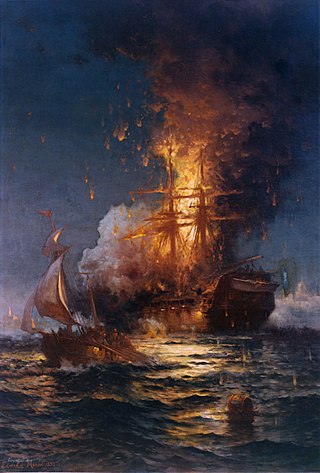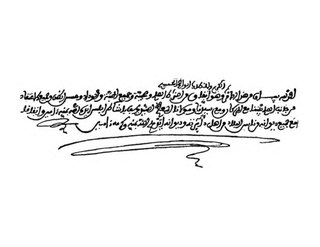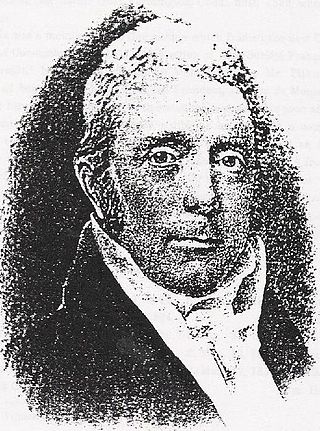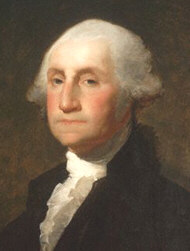
The Federalist Party was a conservative and nationalist American political party and the first political party in the United States. It dominated the national government under Alexander Hamilton from 1789 to 1801. The party was defeated by the Democratic-Republican Party in 1800, and it became a minority party while keeping its stronghold in New England. It made a brief resurgence by opposing the War of 1812, then collapsed with its last presidential candidate in 1816. Remnants lasted for a few years afterwards.

Presidential elections were held in the United States from November 1 to December 4, 1816. In the first election following the end of the War of 1812, Democratic-Republican candidate James Monroe defeated Federalist Rufus King. The election was the last in which the Federalist Party fielded a presidential candidate.

The First Barbary War (1801–1805), also known as the Tripolitan War and the Barbary Coast War, was a conflict during the 1801–1815 Barbary Wars, in which the United States fought against Ottoman Tripolitania. Tripolitania had declared war against the United States over disputes regarding tributary payments in exchange for a cessation of Tripolitanian commerce raiding at sea. United States President Thomas Jefferson refused to pay this tribute. The First Barbary War was the first major American war fought outside the New World, and in the Arab world, besides the smaller American–Algerian War (1785–1795).

The Barbary Wars were a series of two wars fought by the United States, Sweden, and the Kingdom of Sicily against the Barbary states and Morocco of North Africa in the early 19th century. Sweden had been at war with the Tripolitans since 1800 and was joined by the newly independent US. The First Barbary War extended from 10 May 1801 to 10 June 1805, with the Second Barbary War lasting only three days, ending on 19 June 1815. The Barbary Wars were the first major American wars fought entirely outside the New World, and in the Arab World.

The Second Barbary War, also known as the U.S.–Algerian War and the Algerine War, was a brief military conflict between the United States and the North African state of Algiers in 1815.

Abraham Alfonse Albert Gallatin was a Genevan-American politician, diplomat, ethnologist, and linguist. Often described as "America's Swiss Founding Father", he was a leading figure in the early years of the United States, helping shape the new republic's financial system and foreign policy. Gallatin was a prominent member of the Democratic-Republican Party, represented Pennsylvania in both chambers of Congress, and held several influential roles across four presidencies, most notably as the longest serving U.S. Secretary of the Treasury. He is also known for his contributions to academia, namely as the founder of New York University and cofounder of the American Ethnological Society.

The Treaty of Tripoli was signed in 1796. It was the first treaty between the United States and Tripoli to secure commercial shipping rights and protect American ships in the Mediterranean Sea from local Barbary pirates.

The history of the United States from 1789 to 1815 was marked by the nascent years of the American Republic under the new U.S. Constitution.

The presidency of Thomas Jefferson began on March 4, 1801, when Thomas Jefferson was inaugurated as the third President of the United States, and ended on March 4, 1809. Jefferson assumed the office after defeating incumbent president John Adams in the 1800 presidential election. The election was a political realignment in which the Democratic-Republican Party swept the Federalist Party out of power, ushering in a generation of Jeffersonian Republican dominance in American politics. After serving two terms, Jefferson was succeeded by Secretary of State James Madison, also of the Democratic-Republican Party.
Christian amendment describes any of several attempts to amend a country's constitution in order to officially make it a Christian state.

The 2006 State of the Union Address was given by the 43rd president of the United States, George W. Bush, on January 31, 2006, at 9:00 p.m. EST, in the chamber of the United States House of Representatives to the 109th United States Congress. It was Bush's fifth State of the Union Address and his sixth speech to a joint session of the United States Congress. Presiding over this joint session was the House speaker, Dennis Hastert, accompanied by Dick Cheney, the vice president, in his capacity as the president of the Senate.

Opposition to the War of 1812 was widespread in the United States, especially in New England. Many New Englanders opposed the conflict on political, economic, and religious grounds. When the Embargo Act of 1807 failed to remedy the situation with the United Kingdom, with Britain refusing to rescind the Orders in Council (1807) and the French continuing their decrees, certain Democratic-Republicans known as war hawks felt compelled to persuade the United States government to declare war on the British. A number of contemporaries called it, "The second war for independence." Henry Clay and John Calhoun pushed a declaration of war through Congress, stressing the need to uphold American honor and independence. Speaking of the impact of the depressed cotton trade upon his fellow Southerners, Calhoun told Congress that:
They see, in the low price of their produce, the hand of foreign injustice; they know well without the market to the continent, the deep and steady current of supply will glut that of Great Britain; they are not prepared for the colonial state to which again that Power [Great Britain] is endeavoring to reduce us. The manly spirit of that section of our country will not submit to be regulated by any foreign Power.

The First Report on the Public Credit was one of four major reports on fiscal and economic policy submitted by Founding Father and first US Treasury Secretary Alexander Hamilton on the request of Congress. The report analyzed the financial standing of the United States and made recommendations to reorganize the national debt and to establish the public credit. Commissioned by the US House of Representatives on September 21, 1789, the report was presented on January 9, 1790, at the second session of the 1st US Congress.
The 1810 State of the Union Address was given during the first term of President James Madison, the fourth president of the United States. It was given on Wednesday, December 5, 1810 in Washington, D.C. It was "concerning the commercial intercourse between the United States and Great Britain and France and their dependencies having invited in a new form a termination of their edicts against our neutral commerce." It was addressed to the Senate and House of Representatives, it was given right before the War of 1812 began. It was given to the 11th United States Congress, which contains both Houses.

The state of union is an address, in the United States, given by the president to a joint session of Congress, the United States House of Representatives and United States Senate. The United States constitution requires the president "from time to time give to the Congress Information of the State of the Union." Today the state of the union address is given as a speech, though this is not a requirement of the constitution. George Washington chose to address the Congress in a speech annually; on October 25, 1791, he gave his third speech.
The 1901 State of the Union Address was given on Tuesday, December 3, 1901, by the 26th president of the United States, Theodore Roosevelt. It was presented to both houses of the 57th United States Congress, but he was not present. He stated, "The Congress assembles this year under the shadow of a great calamity. On the sixth of September, President McKinley was shot by an anarchist while attending the Pan-American Exposition at Buffalo, and died in that city on the fourteenth of that month." He concluded it with, "Indeed, from every quarter of the civilized world we received, at the time of the President's death, assurances of such grief and regard as to touch the hearts of our people. In the midst of our affliction we reverently thank the Almighty that we are at peace with the nations of mankind; and we firmly intend that our policy shall be such as to continue unbroken these international relations of mutual respect and good will."

The 1814 State of the Union Address was given by the fourth president of the United States, James Madison, to the 13th United States Congress. It was given on Tuesday, September 20, 1814, during the height of the War of 1812. It was given during President Madison's turbulent second term. One month after he gave the speech, the British burning of Washington occurred on August 24, and President Madison fled and lived in The Octagon House. Madison lived there until 1816, until the White House could be rebuilt. The three key points are:
The 1815 State of the Union Address was given by the fourth president of the United States, James Madison. It was given to the 14th United States Congress on Tuesday, December 5, 1815, but not verbally by the president. The War of 1812 was over, and he said, "It is another source of satisfaction that the treaty of peace with Great Britain has been succeeded by a convention on the subject of commerce concluded by the plenipotentiaries of the two countries. In this result a disposition is manifested on the part of that nation corresponding with the disposition of the United States, which it may be hoped will be improved into liberal arrangements on other subjects on which the parties have mutual interests, or which might endanger their future harmony." He concluded with, "As fruits of this experience and of the reputation acquired by the American arms on the land and on the water, the nation finds itself possessed of a growing respect abroad and of a just confidence in itself, which are among the best pledges for its peaceful career."
The 1829 State of the Union Address was delivered by the seventh president of the United States, Andrew Jackson, on December 8, 1829, to the 21st United States Congress. This was Jackson's first address to Congress after his election, and it set the tone for his presidency, emphasizing limited government, states’ rights, and the removal of Native Americans from their lands.

The 1805 State of the Union Address was given by the third president of the United States, Thomas Jefferson, on Tuesday, December 3, 1805. He did not give it directly to the 9th United States Congress, but only presented his written address. It was the first of his second term in the White House. He began with, "At a moment when the nations of Europe are in commotion and arming against each other, and when those with whom we have principal intercourse are engaged in the general contest, and when the countenance of some of them toward our peaceable country threatens that even that may not be unaffected by what is passing on the general theater, a meeting of the representatives of the nation in both Houses of Congress has become more than usually desirable." He ended with, "On this first occasion of addressing Congress since, by the choice of my constituents, I have entered on a second term of administration, I embrace the opportunity to give this public assurance that I will exert my best endeavors to administer faithfully the executive department, and will zealously cooperate with you in every measure which may tend to secure the liberty, property, and personal safety of our fellow citizens, and to consolidate the republican forms and principles of our Government."














